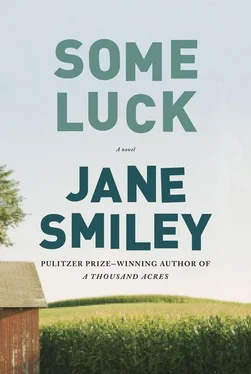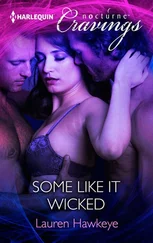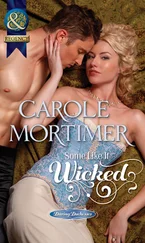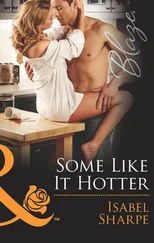“Well,” said Eloise, “perhaps it would have been better if you and the Larsens, is it, had shared the tractor. Possessions often possess us. I was reared on a farm. I know what that means, don’t I, Julius?” She turned back to Rosanna. “I remember full well, when we were children, how nobody had all the right equipment, and so, at harvest time and butchering time, people went around to other farms and helped. That’s all I mean. That’s the basis of a cooperative movement.”
“We still do that. Make big suppers and all. Mama was here with all her friends for the oat harvest two weeks ago. It’s enjoyable.”
Everyone seemed relieved.
Eloise turned to Mr. Silber and said, “In fact, Rosanna always served the best ice cream. I made the kids turn the crank.”
Eloise and Uncle Julius were gone by the time Frank and Papa got back. The tractor was a black Farmall with red wheels. You started the engine in the front with gas, that was called the pony engine, and then that started the real engine, which ran on diesel. Frankie thought the tractor was the greatest thing since his bicycle, but Joe thought it was noisy and ugly, and he didn’t like the idea of Jake and Elsa never doing anything again — that might be a step toward Papa’s deciding that they had no use anymore and sending them to the slaughterhouse on the other side of Usherton. Joe knew perfectly well that it was one thing for Papa to say that Jake and Elsa had been good horses and would always have a home, and quite another for one of them to step in a hole and break a leg and Papa to decide that it wasn’t worth calling the vet to save him or her. When he grew up, Joe thought, he was going to have a dog, and no one would stop him.

FRANK WAS FOURTEEN, but he looked sixteen and acted eighteen. He got up every morning and did his work around the farm first, then he cleaned up, got on his bike, and was out of the house before Mama had even come down. He could get to the high school in fifteen minutes, depending on the condition of the road and the strength of the tailwind. This year there wasn’t much snow, and what there was was light and dry and blew away almost as soon as it fell. When he got there, Frank parked his bike and cleaned himself up again. The high school was fairly new, a big brick building with white-framed windows and high ceilings. It had been in session for three years, but already there was a social divide between the farm boys and the town boys — even if they were from the “town” of Denby, or the “town” of Randolph, which was five miles north of Denby, and even smaller. The nicer part of Usherton was south of Main Street, and kids from down there went to another high school, but the Usherton kids at North High were happy to put on airs around the farm kids. Though not around Frank.
Frank had never enjoyed anything in his life as much as he enjoyed the high school. He enjoyed the Roman Empire, he enjoyed pistils and stamens, he enjoyed a ( b + c ) = x , he enjoyed Treasure Island , he enjoyed shop class, he enjoyed chorus, he enjoyed sauntering down the hall as if he had all the time in the world, he enjoyed smiling at the girls and laughing at the guys (or with the guys — the key was that they would never be able to tell the difference). He enjoyed being tall, he enjoyed being broad-shouldered, and he enjoyed the looks he got as he made his way. Yes, everyone knew he was a farm kid — he didn’t lie about that — but he made sure that he never had any shit on his shoes and that he always looked smooth and relaxed. His smile (he worked on it) was slow, and he never said yes or no, he always said “Maybe,” as in “Did you do that assignment?” “Maybe.” “Have you seen Broadway Bill ?” “Maybe.” “Are you going to Freddie Haywood’s Christmas party?” “Maybe.” There was a lot you could do with “maybe”—yes, no, I don’t care, I’m not telling you, I haven’t made up my mind. It was exactly the sort of word that Walter and Rosanna hated most. And the very best thing about being at the high school was that Minnie and Joey hadn’t come with him. He rode his bike three miles, and he got away from everyone he knew, just about. It could not be said that he had friends at high school. But he didn’t want friends — he wanted pals and associates, the sort of teachers and kids who didn’t ask questions and let you do what you wanted. Of course, there was a price to pay, and he paid it every day — pedaling home with the afternoon wind in his face, blinding him with tears even if his muffler was wrapped up to his eyes. Fifteen minutes to school was thirty minutes home. But he just gritted his teeth and pedaled harder, rain or snow. Mama worried and Papa was impressed; best of all, they left him alone.
ROSANNA FOUND Henry to be a mysterious child. One morning in March, not yet a year and a half old, he refused the breast. There was a look on his face that she had seen before on him — skeptical. If you handed him a toy he didn’t care for or showed him a book he wasn’t interested in, he got the same look. Now it was her breast. She closed the front of her dress with some sense of embarrassment, as if it were she who had gone too far. Downstairs, she had the distinct feeling, as she set him in the high chair and scrambled him an egg, that he had come to a decision — enough of that — and he would never look back. It was not as though he were universally hard to please — he ate up his egg and some oatmeal and a spoonful of applesauce that Granny Elizabeth had made in the fall; he loved Lillian (as who did not?), and he laughed readily at games and antics — but he was discriminating. Rosanna had never had a discriminating child before — whiny, yes; picky (Granny Mary had said Lillian was picky when the girl wouldn’t wear that hideous green sweater Oma had knitted for her), yes; hard to understand, yes — but there was something rather impersonal about Henry. He was built in a certain way, that was all. Rosanna was both intimidated and intrigued. When she was away from him, she didn’t imagine him the proper baby size — always bigger. The other thing was that, even though he looked just like Lillian, she never thought he was beautiful or alluring in the same way that Lillian was, and that, she thought, was because he was so self-contained.
All day long that day, Rosanna kept her eye on him, followed him, handed him a toy or two. He played quietly, looked out the window, ate his dinner, went down for his nap, made no trouble.
And then Lillian got home. Rosanna was in her own room, folding laundry, when she heard Joe’s and Lillian’s steps on the front porch, and it wasn’t more than a moment after that, before Lillian even called out or opened the door, that Henry shouted, “Mama! Up!” Normally, she would have finished what she was doing before going in, but, just to see with her new eyes, she dropped the socks she was balling together, went to the hallway, and peeped into Henry’s room. He was staring at the door, a big smile on his face. So she went in. His face fell. She said, “Want to see Lillian, Henry? She’s home from school.” His face lit up again. Well, she thought as she carried him down the stairs, things could not be clearer than that. But she was oddly unmoved — or, at least, she recognized repayment when she saw it. She, who had always had a favorite, no matter how hard she tried to love them equally and for themselves, as Jesus loved all the little children, was now not the favorite. She thought of a phrase from the Bible — where, she did not know—“In all that has happened to us, you have been just; you have acted faithfully, while we did wrong.”
Читать дальше













